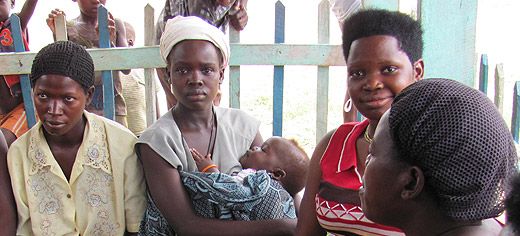
A new report on Uganda's emerging oil and gas industry says companies can improve their corporate social responsibility (CSR) to give fairer employment, compensation and land deals to communities.
The report Seeking Benefits and Avoiding Conflicts: A Community-Company Assessment of Uganda's Hydrocarbon Industry is the culmination of a year of consultation, validation discussions, roundtables and workshops, conducted by the Ugandan members of the study team and coordinated by the Civil Society Coalition on Oil and Gas (CSCO). The University of Leeds provided overall project support and leadership. Business-Community Synergies (BCS) provided training and guidance on the methodology.
The study is part of a broader, four-year study coordinated by the University of Leeds into how large-scale discoveries of natural resources in Uganda, Ghana (oil and gas), Brazil (bauxite) and Zambia (copper) can benefit people living in and around areas of natural resource extraction.
The Uganda report focuses on the relationship between Tullow Oil - a London-based oil and gas exploration and production company listed in the FTSE 100 - and communities living in and near the Albertine Graben, where Tullow has experienced tremendous commercial success in the past four years. The study team used the Community-Company Assessment (CCA) methodology, which BCS developed and has used successfully in several settings including Northern Canada, Namibia, Mali, Peru and the United States. Using the interviews gathered through the CCA process, researchers refined the material into six recommendations for Tullow:- Reform local hiring process to maximize community employment opportunities
- Follow international best practice when compensating community members for displacement or relocation
- Address fear and anxiety about potential evictions and establish grievance and consultation mechanisms
- Improve information-sharing and community interaction processes
- Work to prevent illegal land speculation by third parties, and
- Improve the process of choosing and implementing CSR projects
At the report's launch in Kampala on December 1, Henry Bazira, Chairperson of CSCO, the organisation that has led the year of consultation workshops and roundtables at several levels of government and civil society, summarised the findings and challenged the 100-plus participants -- including MPs from Uganda, Ghana and Tanzania and many Non-Governmental Organisation (NGO) representatives -- to pick meaningful talking points and continue to advocate for better community-oil company relations.
BCS President Dr Rani Parker, who designed the research methodology, trained the researchers, and led the field work, said: "Natural resource extractive contexts are highly challenging and complex from every level of governance. However, nothing is more powerful than being able to give voice to one's concerns and hopes, learning to hear different perspectives, to acknowledge the reality of viewpoints with which one may not agree, and to build relationships of trust."
The project's director, Dr James Van Alstine from the Sustainability Research Institute, University of Leeds, said: "While corporate social responsibility projects are generally welcomed and desired by local communities in Uganda's oil producing Lake Albert region, our research has found that the nature of the projects and how they are implemented can be improved.
For example, it is important to ensure that company interventions are consistent with government development plans and local priorities. "In addition, much of the work on 'good governance' in the extractive industries by NGOs and development partners has focused on national level regulatory frameworks and revenue transparency.
While these issues are important, our work has demonstrated the need for research-driven community, industry and local government engagement at the site of resource extraction, in order for often marginalised community voices to be heard at the highest levels of decision-making." Core funding for the project comes from the United States-based Alcoa Foundation.
Notes to editors
The report Seeking Benefits and Avoiding Conflicts: A Community-Company Assessment of Uganda's Hydrocarbon Industry is available online at: www.lse.ac.uk/communitycapacities The Zambia report is also available on the website. The Ghana report is scheduled for publication in March 2012 and the Brazil report in June 2012.The Community-Company Assessment (CCA) methodology is designed to help communities negotiate with large companies from a position of strength.
The analysis is based on the use of open-ended questions to ensure respondents rather than interviewers identify important themes, and the validation of data with community representatives using participatory techniques.
For more information To request an interview with Dr James Van Alstine please contact the University of Leeds Press Office on +44 (0)113 343 4031 or email pressoffice@leeds.ac.uk
Contact details for Dr Rani Parker, E: RParker@BCSynergies.com (or via Mara Gasana, T: 00 1 301 580-1289, E: MaraGasana@BCSynergies.com) or visit www.bcsynergies.com/cca
Contact details for Henry Bazira, E: watergovinst@gmail.com
More detail about the four year Sustainable Synergies project available at: www.lse.ac.uk/communitycapacities